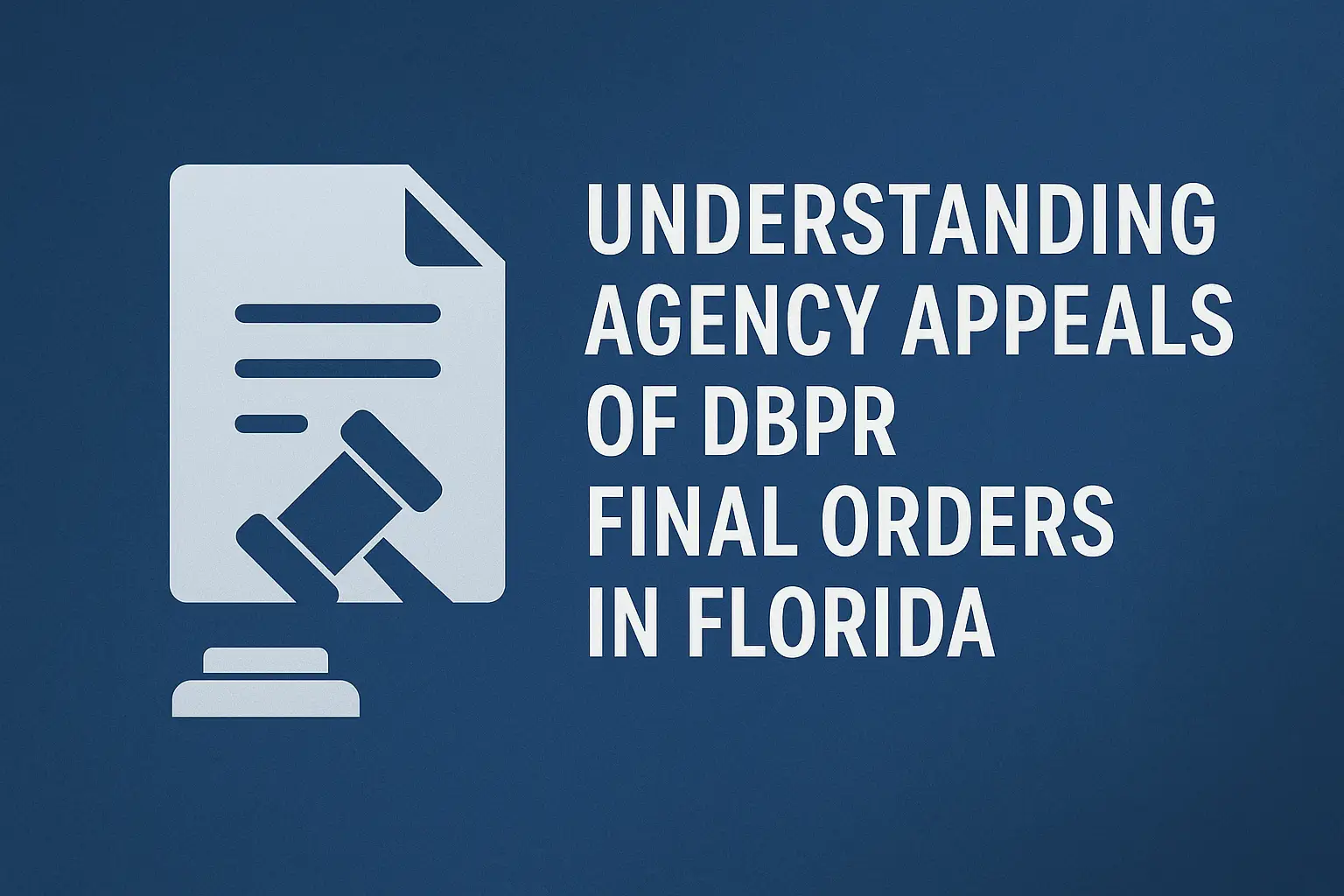When the Florida Department of Business and Professional Regulation (DBPR) or a professional licensing board issues a Final Order against a licensed contractor, real estate agent, or other professional, the consequences can be severe—suspension, revocation, or monetary penalties. Fortunately, Florida law provides a formal process to challenge these actions through judicial review.
At Douglas Firm, we help licensed professionals and businesses navigate the full lifecycle of DBPR enforcement—from initial complaint through administrative hearings and, when necessary, agency appeals in the Florida District Courts of Appeal.
What Is an Agency Appeal?
An agency appeal is the process by which a licensee challenges a Final Order issued by a state agency such as the DBPR. These appeals are governed by Chapter 120 of the Florida Statutes, known as the Administrative Procedure Act (APA), and are heard in Florida’s District Courts of Appeal.
Agency appeals do not involve a new trial. Instead, the appellate court reviews the legal sufficiency of the Final Order, ensuring the agency applied the law correctly and followed due process.
When Can You Appeal?
You have the right to appeal once a Final Order is issued. This often follows:
- A formal or informal administrative hearing under § 120.57,
- A Recommended Order issued by an Administrative Law Judge (ALJ),
- Or a default or stipulated settlement that becomes final agency action.
Appeals must be filed within 30 days of the date the Final Order is rendered. This deadline is strict, and missing it can forfeit your right to review.
Common Grounds for Appeal
On appeal, the court reviews whether:
- The agency misinterpreted or misapplied the law;
- The findings in the Final Order are unsupported by competent, substantial evidence;
- The licensee was denied procedural due process;
- The agency failed to comply with the essential requirements of law;
- The agency improperly rejected or modified a Recommended Order under § 120.57(1)(l), Fla. Stat.
Standards of Review in DBPR Appeals
The standard of review defines how much deference the appellate court gives to the agency’s decision. These are the most common standards in DBPR appeals:
- De Novo (no deference) – Applied to questions of law and statutory interpretation. The appellate court reviews legal issues fresh and without deferring to the agency’s conclusions.
- Competent, Substantial Evidence – Applied to factual findings. The court does not re-weigh evidence but determines whether the findings are supported by evidence a reasonable person would rely upon.
- Abuse of Discretion – Applied to the agency’s discretionary decisions, such as the imposition of penalties. The court will reverse only if the decision was arbitrary, capricious, or unreasonable.
- Procedural Due Process – The court evaluates whether the licensee received notice and a meaningful opportunity to be heard under fair procedures.
Understanding how these standards apply helps frame strong arguments on appeal and ensures that the appellate court evaluates the right issues under the correct lens.
Can You Stop Enforcement During the Appeal?
Yes. Under § 120.68(3), Florida Statutes, if the Final Order suspends or revokes a license, the licensee is generally entitled to a stay (also known as supersedeas) while the appeal is pending—unless the agency shows that continued practice would pose a risk to public health, safety, or welfare.
We assist clients in seeking stays both at the agency level and through emergency motions filed directly with the appellate court.
Where Is the Appeal Filed?
You may file your appeal in:
- The First District Court of Appeal in Tallahassee, where DBPR is headquartered, or
- The District Court of Appeal where you reside.
This allows some flexibility in choosing the appellate venue that best suits your case.
The Role of the Election of Rights Form
Before a Final Order is ever issued, the licensee is often required to complete an Election of Rights form. This form offers a choice between:
- An Informal Hearing, if you agree with the facts but dispute the penalty or legal interpretation, or
- A Formal Hearing before an ALJ at the Division of Administrative Hearings (DOAH), if you dispute the facts.
Important: Choosing the wrong type of hearing can waive key defenses.
✔️ A formal hearing preserves your right to challenge both the findings of fact and conclusions of law.
❗ An informal hearing limits your rights to legal argument only.
If you are unsure how to proceed, contact legal counsel immediately. We advise clients on the correct election, ensure they preserve all legal defenses, and help develop a strong administrative record for appeal if needed.
Why Work with Douglas Firm?
Agency appeals require deep familiarity with Florida administrative law, strict procedural rules, and appellate strategy. At Douglas Firm, we represent clients throughout every phase of the DBPR process, including:
- Responding to Uniform Complaints,
- Negotiating with DBPR enforcement counsel,
- Defending at formal DOAH hearings,
- Filing Notices of Appeal and preparing appellate briefs,
- Seeking stays of enforcement to keep you working while your appeal proceeds.
Protect Your License—Protect Your Career
If you’ve received a Final Order from the DBPR or a professional licensing board, you may only have 30 days to act. The sooner you consult an attorney, the better positioned you’ll be to preserve your rights and protect your livelihood.
📞 Call Douglas Firm at (954) 474-4420 or
💻 Contact us online today for a confidential consultation about your DBPR appeal.

